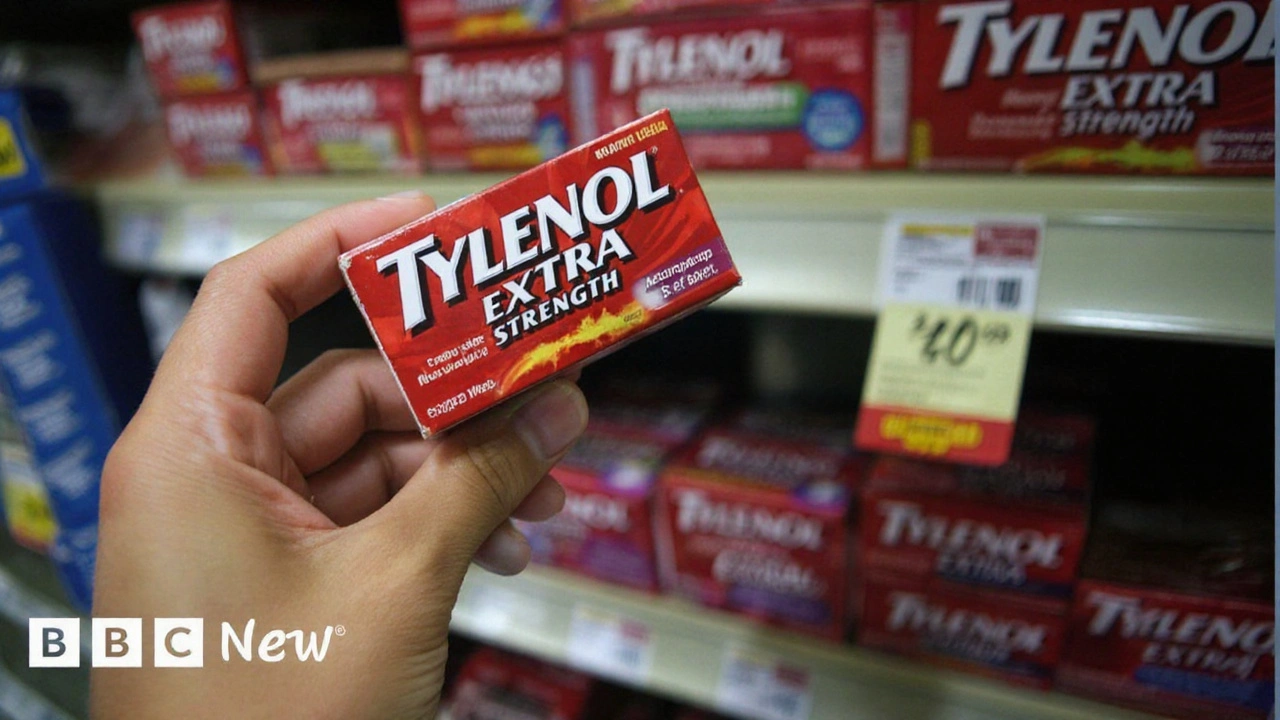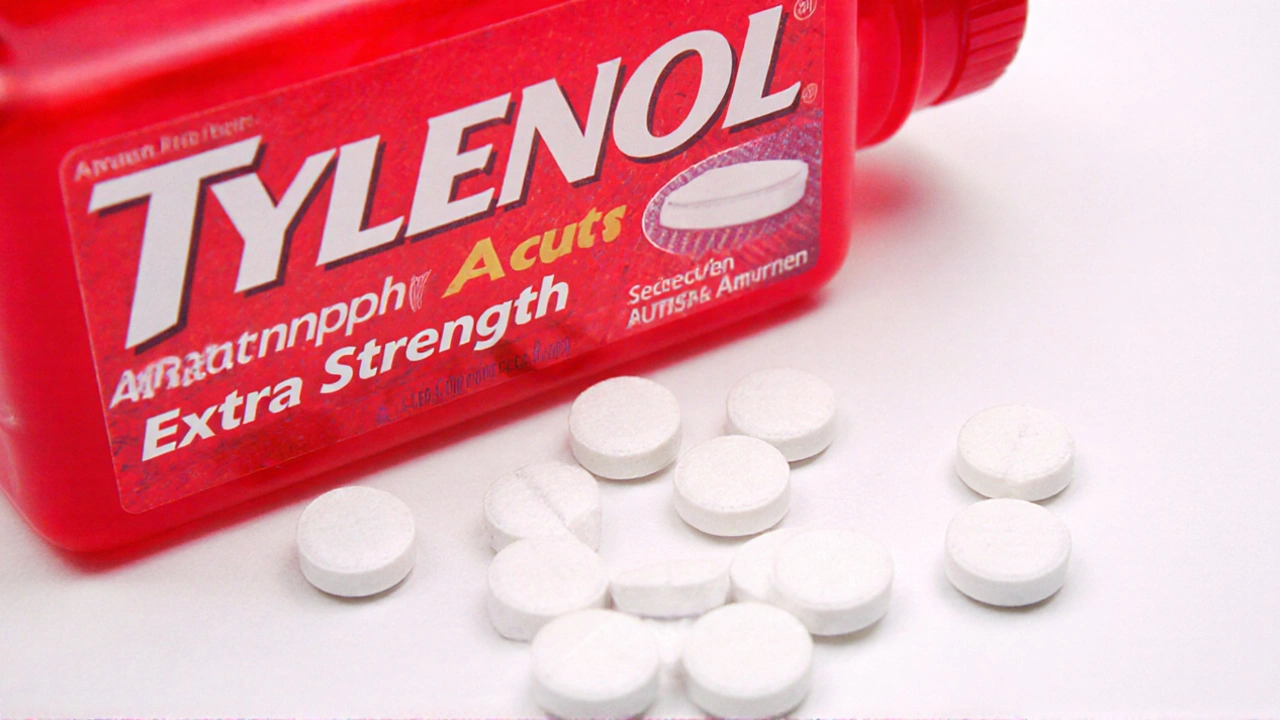26 Sep 2025
- 13 Comments
FDA prepares new warning for a drug millions of expectant mothers already trust
In a move that could reshape how pregnant women manage everyday aches, the Food and Drug Administration announced it will begin drafting a label revision for over‑the‑counter acetaminophen products. The proposed wording would flag emerging research that suggests taking the medication during pregnancy might raise the odds of neurodevelopmental conditions such as autism spectrum disorder and attention‑deficit/hyperactivity disorder.
Commissioner Marty Makary, M.D., M.P.H., told reporters the agency is acting on a "considerable body of evidence" that points to a possible link. "Even with that evidence, the choice still belongs with parents," he said, adding that the precautionary principle could lead many to skip the drug unless it’s truly needed. "Most low‑grade fevers don’t require treatment, but it remains reasonable for pregnant women to use acetaminophen in certain scenarios," Makary added.
Acetaminophen, sold under brand names like Tylenol, is the go‑to fever reducer for pregnant people because alternatives such as aspirin or ibuprofen carry known risks to fetal development. Roughly 50 % of pregnant individuals worldwide report taking the medication at some point, according to global health surveys.

Scientists, clinicians and policymakers clash over the data
Behind the policy push lies a heated debate within the scientific community. Large observational studies—including the Nurses' Health Study II and the Boston Birth Cohort—have reported statistically significant associations between regular acetaminophen use in pregnancy and later diagnoses of autism or ADHD in children. Some researchers argue the signal is strongest when the drug is taken chronically throughout the entire gestation period.
Yet other experts warn that correlation does not equal causation. James Cusack, chief executive of the UK autism charity Autistica, cautioned that "there is no definitive evidence to suggest that paracetamol use in mothers is a cause of autism, and when you see any associations, they are very, very small." He stressed that autism is a multifactorial condition, with genetics, environment and a host of other variables still under investigation.
The FDA itself acknowledged that while many studies describe an association, a causal link has not been firmly established and several papers report null findings. "Acetaminophen remains the only over‑the‑counter drug approved for treating fevers during pregnancy," the agency noted, emphasizing that untreated high fevers can jeopardize fetal health.
President Donald Trump weighed in during a White House briefing, calling acetaminophen "a very big factor" in the country's rising autism rates. Health and Human Services Secretary Robert F. Kennedy Jr. echoed the sentiment, framing the issue as part of a broader effort to tackle what the administration calls a national autism epidemic. White House press secretary Karoline Leavitt described the move as "a powerful display of how the entire Trump administration is committed to addressing root causes of chronic conditions and diseases."
Critics argue that the political framing could sow confusion among pregnant women trying to make safe health choices. Leavitt responded to questions about potential misinterpretation by saying reporters should avoid jumping to conclusions before the administration officially confirms the policy details.
- FDA’s proposed label would likely include language such as "Studies have shown an association between prenatal acetaminophen use and an increased risk of autism and ADHD in offspring."
- Physicians are expected to discuss the new warning during prenatal visits, emphasizing risk‑benefit analysis.
- Pharmacies may begin displaying informational leaflets alongside the medication.
While the label change is still in draft form, the ripples are already felt in clinical settings. Obstetricians report an uptick in patients asking whether they should avoid the drug altogether, and some midwives are recommending non‑pharmacologic approaches—like cool compresses or hydration—to manage mild fevers.
Meanwhile, researchers are gearing up for further investigations. A few ongoing longitudinal studies aim to parse out whether timing, dosage or genetic predispositions modify the observed association. The National Institutes of Health has earmarked modest funding to explore the biological mechanisms that could link acetaminophen exposure to neurodevelopmental outcomes, such as oxidative stress pathways and placental transport.
In the broader public health conversation, the debate underscores a perennial tension: how to act on emerging scientific signals without over‑regulating widely used, generally safe medications. The FDA’s precautionary stance reflects a willingness to err on the side of informing consumers, but it also opens the door to potential alarmism.
For expectant parents navigating this evolving landscape, the takeaway is clear: discuss any medication concerns with a trusted healthcare provider, weigh the benefits against the possible risks, and stay tuned for the final label language once the FDA completes its review. The story of acetaminophen autism links is far from settled, and the next chapter will likely hinge on deeper, more definitive research.


sumi vinay
September 26, 2025Hey everyone, great to see this discussion heating up! Even though the science is still swirling, I truly believe we can make informed choices and keep both mums and babies safe. Remember, a little caution now can lead to big smiles later. Keep asking questions and sharing reliable info – together we’ll navigate this maze. Stay hopeful, stay healthy!
Anjali Das
September 26, 2025The moment the government starts meddling with a proven, affordable drug is when you see the danger of political overreach. We shouldn't let foreign media dictate our health policies; our own doctors know best. This label change is just fear‑mongering to push a hidden agenda.
Dipti Namjoshi
September 26, 2025I hear the anxiety many expectant parents feel, and it’s completely understandable. While the data hint at a possible link, we must also weigh the proven risks of untreated fever. It’s a delicate balance between precaution and panic. Open dialogue with healthcare providers, rooted in compassion, can guide each family to the decision that feels right for them.
Prince Raj
September 27, 2025From a pharmacovigilance standpoint, the risk‑benefit calculus for acetaminophen during gestation hinges on dose‑response relationships, metabolic pathways, and placental transfer kinetics. Collaborative consensus among obstetricians, neonatologists, and toxicologists is essential to refine clinical guidelines. Let’s pool our expertise to generate robust, evidence‑based protocols that mitigate potential neurodevelopmental hazards without sacrificing analgesic efficacy.
Gopal Jaat
September 27, 2025Alas! The very medicine that has soothed countless fevers now stands at the crossroads of controversy. Though its safety profile is celebrated, the whispers of risk have cast a shadow upon its reputation. Must we abandon a trusted ally, or merely wield it with greater caution? The drama unfolds in every prenatal clinic, where hope and doubt waltz together.
UJJAl GORAI
September 27, 2025Ah, the ever‑spinning carousel of “emerging evidence” and governmental alarmism-truly a masterpiece of modern public health theatre. One cannot help but marvel at the swift transition from “studies suggest a possible association” to “we must label a safe, over‑the‑counter drug as a potential threat to neurodevelopment.” It is as if the mere whisper of a correlation summons an army of regulators brandishing warning labels like medieval swords. Of course, the scientific method, that noble quest for causality, is conveniently set aside in favor of headline‑grabbing narratives. Let us consider the epidemiological nuance: observational cohorts are riddled with confounders-maternal fever itself, socioeconomic status, genetic predispositions-all of which could masquerade as the true culprit. Yet the discourse drowns out these subtleties, opting instead for a black‑and‑white proclamation that every pregnant woman must now dread. Meanwhile, the pharmaceutical industry watches with bated breath, poised to either reap the profits of heightened awareness or suffer the sting of diminished sales. The public, meanwhile, is left to navigate a sea of mixed messages, uncertain whether to trust their doctor, the FDA, or the latest political soundbite. In the grand scheme, perhaps the most prudent approach is to maintain a balanced perspective: recognize the signal, scrutinize the noise, and avoid panic‑inducing overregulation. Until rigorous randomized trials illuminate the path, let us not sacrifice common sense on the altar of speculation. We should also remember that fever itself can be harmful to the fetus, so untreated illness is not a benign alternative. Thus, the decision matrix remains complex, demanding individualized risk assessment. Clinicians must communicate both the known benefits and the tentative risks without resorting to alarmist rhetoric. Only through transparent dialogue can we hope to empower expectant mothers rather than confound them. Future research, ideally with prospective designs, will be the true litmus test for these preliminary associations.
Satpal Singh
September 27, 2025It’s important to respect the scientific process while also acknowledging the genuine concerns of pregnant individuals. The FDA’s precautionary language aims to inform, not to frighten, and clinicians can help interpret these nuances for patients. Maintaining a balanced perspective ensures that neither alarm nor complacency dominates the conversation.
Devendra Pandey
September 27, 2025While many are quick to label acetaminophen as a villain, the data remain inconclusive and often over‑interpreted. A single association does not prove causation, and the risk of untreated fever may outweigh theoretical harms. It’s essential to keep the discourse grounded in solid evidence rather than sensationalism.
manoj jadhav
September 27, 2025Friends, let’s remember that every medication carries a risk‑benefit profile, and the decision should be individualized; open dialogue with healthcare providers is key; calling for blanket bans may do more harm than good; we can seek alternative methods for mild fevers while staying informed about the latest research.
saurav kumar
September 27, 2025Honestly, I’d still take Tylenol if I needed it.
Ashish Kumar
September 27, 2025It is morally reprehensible to compromise the health of unborn children for the sake of convenience. If we ignore the warning signs, we are complicit in a preventable tragedy, and history will judge us harshly for prioritizing profit over protection. This is not a mere policy tweak; it is a call to consciousness.
Pinki Bhatia
September 27, 2025I understand why some mothers feel uneasy about the new label, and I also recognize the importance of managing fever effectively. By fostering supportive conversations between patients and clinicians, we can navigate these concerns without sacrificing safety. Empathy and evidence should go hand in hand.
NARESH KUMAR
September 27, 2025Let’s keep this discussion supportive and fact‑based, community! 🌟 Sharing reliable sources helps everyone make the best choices for their families. Remember, we’re all in this together, so stay kind and stay informed. 😊